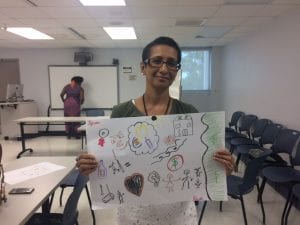The Power of Emergent Leadership: Interdisciplinary Research Leaders Fellows Self-Organize Puerto Rico Convening

This summer, Interdisciplinary Research Leaders cohort one fellows demonstrated the power of emergent leadership when they self-organized a convening in San Juan, Puerto Rico. Inspired by the time they shared together at the national convening of all Robert Wood Johnson Foundation (RWJF) leadership programs last fall, fellows were eager to reconnect before the next formally scheduled convening, so they could continue to learn from one another, support each other’s work, and make significant progress on their team-based research projects.
The cohort one fellows voiced this desire to the Interdisciplinary Research Leaders program, which responded with generous support, providing financial and logistical backing to the fellows. The fellows took that support and turned it into action—designing and hosting the program’s first fellow-organized convening in Puerto Rico.
The fellows organized the event as an “unconference,” a model based on the belief that there is as much knowledge and insight in the room as there is on the stage at a typical conference. Unconference activities call on participants to actively engage in the development of the agenda and discussion in real time, relying on leaders to emerge naturally. A core unconference activity is the “Open Space,” where participants propose and lead lightly moderated discussions driven by shared questions or original insights generated by the group.
Fellows also used this gathering to organize a writing workshop to peer-edit each other’s latest research and policy briefs, book chapters, blogs, and journal articles, with the goal of improving everyone’s writing for publication. It’s another example of the “crowdsourcing” nature of this group and the recognition that every member is a learner and every member is a leader.
The group selected San Juan, Puerto Rico, as their destination so fellows could apply their time and resources to support individuals, community organizations, and businesses recovering from both Hurricane Maria and centuries of economic exploitation. Through site visits and service projects, they met community members, volunteers, and staff working on efforts to rebuild Puerto Rico. Site visits included:
Villa Calma, a community-organized nonprofit established to support a community of 350 residents who were displaced after seven to nine feet of water rushed into their community.
Taller Salud, an organization founded in 1979 to help guarantee the right to abortion and access to contraceptives as an alternative to the mass sterilization of poor Latin American women, mostly Puerto Ricans.
Salud para Piñones, a community-based research project to address the increased health threats from chronic diseases that Puerto Ricans face, particularly diabetes and hypertension.
PECES, a project fostering the social, economic, and educational development of individuals and communities experiencing social disadvantage by inspiring leaders, especially youth, to become champions in their own communities.
CAUCE, the Urban, Community and Business Action Center of Río Piedras, which allocates its resources to the collaboration for the revitalization of the urban center and River Plate communities.
Authentic engagement, life-long learning, and a commitment to health equity are core values of Interdisciplinary Research Leaders. The program provides an opportunity for fellows to tap into their own depth of experience and wisdom, and lead from there—as they did in self-organizing and hosting the Puerto Rico Convening. To see photographs from the Interdisciplinary Research Leaders Puerto Rico convening, and stay up-to-date on other news, follow @IRLeaders on Twitter.
Interdisciplinary Research Leaders is a leadership development opportunity for teams of researchers and community partners, including community organizers and advocates. These teams use the power of applied research—informing and supporting critical work being done in communities—to accelerate that work and advance health and equity. Their innovation helps build a Culture of Health, one that enables everyone in America to live longer, healthier lives. Learn more.

Interdisciplinary Research Leaders fellow Revathi Hines, PhD (Alphonse Jackson Professor of Political Science, Department of Political Science, College of Social and Behavioral Sciences, Southern University and A&M College, Baton Rouge, Louisiana) participated in an “open space” activity about visualizing community.
